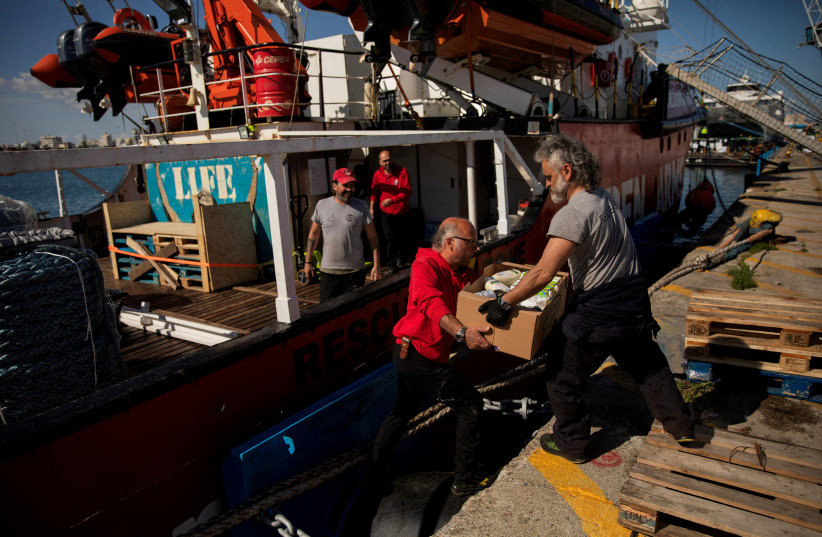The New Israel Fund opened its latest fundraising pitch Wednesday with a Passover-themed plea: “Let all who are hungry come and eat.”
The reference to the upcoming holiday was not the only way the appeal was topical. The US-based nonprofit, which funds a variety of progressive organizations in Israel, was, for the first time, raising money to help aid groups distribute food and other supplies in the Gaza Strip. The recipients of the funding will include World Central Kitchen, the target of last week’s fatal Israeli military strike that has drawn widespread international criticism.
The fundraiser comes as a range of Jewish groups are having a public conversation about the challenges surrounding Gaza aid following the WCK strike. The bombing, which killed seven aid workers, has led to increased pressure on Israel from both the US and international bodies to do more to prevent starvation and a humanitarian crisis in the coastal enclave. In response, Israel has increased aid delivery to Gaza, which global health groups say faces the threat of famine.
“Hundreds of thousands of people in Gaza are on the brink of famine,” Daniel Sokatch, NIF CEO, told the Jewish Telegraphic Agency about why his group launched the fundraiser. “We believe we have a moral obligation to help feed them.”
Groups advocate for ceasefire, return of hostages
Sokatch added that the group’s position on the war itself has not changed: NIF, together with a coalition of other progressive Israel-focused groups, supports a ceasefire and return of the hostages Hamas is holding in Gaza. It also calls for a “resumption of genuine effort in pursuit of diplomatic and political resolution to the Israeli-Palestinian conflict.”

While international groups have taken Israel to task for the shortfall of aid in Gaza, and some Israeli protesters have blocked aid convoys, many American Jewish groups have not criticized Israel directly over the humanitarian crisis. A few Jewish groups on the left, including J Street and T’ruah, have taken firmer positions calling for Israel to do more to deliver aid.
The NIF is not the only Jewish group taking a new approach to Gaza aid. On a webinar Wednesday, a senior leader at the American Jewish Committee had a conversation with David Satterfield, the US Special Envoy for Middle East Humanitarian Issues, who was appointed after Oct. 7 as the State Department’s point person on the distribution of Gaza aid.
AJC’s statement mourning the WCK strike condemned Hamas and praised the steps Israel took in response. On Wednesday’s call, the group’s representatives sought to convey concern about Gaza aid while also expressing support for Israel.
Satterfield faced sometimes pointed questioning from AJC Chief Policy and Political Affairs Officer Jason Isaacson about Israel’s responsibility to deliver aid when Hamas remains entrenched in parts of Gaza. Satterfield said Israel does have a responsibility under international law, and that it also hasn’t been doing enough.
“The humanitarian element has lagged. Not enough has been done. And much much more is required here,” Satterfield said. He also said Gaza truly is on the brink of famine, contradicting some pro-Israel advocates, mostly on the right, who have said reports of widespread food shortages are overstated.
“There is an imminent risk of starvation for the majority, if not all, of the 2.2 million population of Gaza. This is not a point in debate. It is an established fact,” he said. He added that Israeli plans to invade the city of Rafah in southern Gaza, which have been the subject of intense debate between the US and Israel, could lead to “disastrous” consequences for the more than a million Palestinians sheltering there.
In response to the WCK strike, which sparked global outrage, Israel has increased the number of aid trucks entering Gaza. The Israeli military has dismissed two officers over the bombing, which it called a tragic mistake.
The NIF says it will redirect all funds raised in its efforts to the WCK and the International Rescue Committee, a global aid group based in New York.
Neither organization is headquartered in Israel, where the fund has historically directed most of its funding. The causes it supports include efforts to preserve democracy, boost minority populations and oppose the settler movement and Israel’s West Bank occupation. Sokatch said the Gaza aid effort fits into the NIF’s mission to advance the “Jewish value” of feeding people who are hungry.
“We cannot sit idly by as a man-made humanitarian crisis knocks at Gaza’s door,” he said. “Jewish memory and tradition demand that we provide food aid to innocents.”
